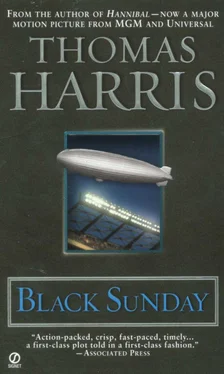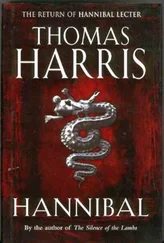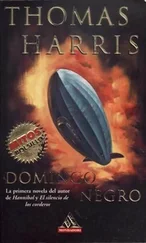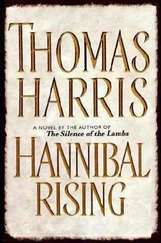“And now there is this.” Tell passed Kabakov a cable from Mossad headquarters. “The information has also been relayed to you in New York.”
The cable reported that Muhammad Fasil was seen, in Beirut the day after Kabakov’s raid. He had a wound on his cheek similar to the one described by Mustapha Fawzi, the first mate of the Leticia.
“Muhammad Fasil,” Tell said quietly, “the worst one of all.”
“I’m not going—”
“Wait, wait, David. This is a time for utter frankness. Is there anyone you know, in the Mossad or elsewhere, who might be better equipped to deal with this matter than you?”
“No, sir.” Kabakov wanted to say that if he had not taken the tape in Beirut, had not questioned Fawzi, if he had not searched the cabin on the ship, checked the ship’s books, caught Muzi at a disadvantage, they would know nothing at all. All he said was “No, sir.”
“That’s our consensus also.” Tell’s telephone rang. “Yes? Five minutes, very well.” He turned back to Kabakov. “Major, would you please report to the conference room on the second floor? And you might straighten your tie.”
Kabakov’s collar was cutting into his neck. He felt as though he were strangling, and he paused outside the conference room to get hold of himself. Maybe the military attaché was about to read him his orders to go home. Nothing would be accomplished by screaming in the man’s face. What was Tell talking about anyway, what consensus? If he had to go back to Israel he would by God go, and the guerrillas in Syria and Lebanon would wish to hell he was back in the United States.
Kabakov opened the door. The thin man at the window turned.
“Come in, Major Kabakov” said the foreign minister of Israel
In fifteen minutes Kabakov was back in the hall, trying to suppress a smile. An embassy car took him to National Airport. He arrived at the El Al terminal at Kennedy International twenty minutes before the scheduled departure of Flight 601 to Tel Aviv. Margaret Leeds Finch of the Times was lurking near the counter. She asked him questions while he checked his bag and while he went through the metal detector. He answered in polite monosyllables. She followed him into the gate, waving her press pass at the airline officials, and dogged him down the very boarding ramp to the door of the plane where she was politely but firmly stopped by El Al security men.
Kabakov passed through first class, through the tourist section, back to the galley where hot dinners were being loaded aboard. With a smile at the stewardess, he stepped out the open door into the elevated bed of the catering truck. The bed whirred downward, and the truck returned to its garage. Kabakov climbed out and entered the car where Corley and Moshevsky were waiting.
Kabakov had been officially withdrawn from the United States. Unofficially, he had returned.
He must be very careful now. If he fouled up; his country would lose a great deal of face. Kabakov wondered what had been said at the foreign minister’s luncheon with the Secretary of State. He would never know the details, but clearly the situation had been discussed at some length. His instructions were the same as before: stop the Arabs. His team was being withdrawn, with the exception of Moshevsky. Kabakov was to be an ex officio advisor to the Americans. He felt sure the last part of his instructions had not been discussed over lunch; if it was necessary to do more than advise, he was to leave no unfriendly witnesses.
There was a strained silence in the car on the way back into Manhattan. Finally Corley broke it. “I’m sorry this happened, old buddy.”
“I am not your old buddy, old buddy,” Kabakov said calmly.
“Customs saw that piece of plastic and they were screaming to bust those guys. We had to bust them.”
“Never mind, Corley. I’m here to help you, old buddy. Here, look at this.” Kabakov handed him one of the pictures given him as he left the embassy. It was still wet from the darkroom.
“Who is it?”
“Muhammad Fasil. Here, read the file.”
Corley whistled. “Munich! How can you be sure he’s the one? The Leticia crew won’t identify him. On advice of counsel, you can bet on that.”
“They won’t have to identify him. Read on. Fasil was in Beirut the day after our raid. We should have gotten him with the others, but we didn’t expect him to be there. He got a bullet stripe on the cheek. The Lebanese on the freighter had a scab across his cheek. Fawzi said so.”
The picture had been taken in a Damascus café in poor light and it was fuzzy.
“If you’ve got the negative, we can improve it with the NASA computer,” Corley said. “The way they enhance the pictures from the Mariner project.” Corley paused. “Has anybody from State talked to you?”
“No.”
“But your own people have talked to you.”
“Corley, ‘my own people’ always talk to me.”
“About working through us. They made it clear you’re going to help with the thinking and we’re stuck with the work, right?”
“Right. You bet, old buddy.”
The car dropped Kabakov and Moshevsky at the Israeli mission. They waited until it was out of sight and took a cab to Rachel’s building.
“Corley knows where we are anyway, doesn’t he?” Moshevsky said.
“Yes, but I don’t want the son of a bitch to think he can drop by whenever he feels like it,” Kabakov said. As he spoke, he was not thinking about Corley or Rachel’s apartment at all. He was thinking about Fasil, Fasil, Fasil.
* * *
Muhammad Fasil was also deep in thought as he lay on his bed in Lander’s ground-floor guestroom. Fasil had a passion for Swiss chocolates, and he was eating some now. In the field he ate the rough fare of the fedayeen, but in private he liked to rub Swiss chocolates between his fingers until the chocolate melted. Then he licked the chocolate off his fingers. Fasil had a number of little private pleasures of this kind.
He had a certain amount of surface passion and a range of visible emotion that was wide and not deep. But he was deep, all right, and cold, and those cold depths held sightless, savage things that brushed and bit one another in the dark. He had learned about himself very early. At the same time he had taught his schoolmates about himself and then he was left alone. Fasil had splendid reflexes and wiry strength. He had no fear and no mercy, but he did have malice. Fasil was living proof that physiognomy is a false science. He was slim and fairly good-looking. He was a monster.
It was curious how only the most primitive and the keenest found him out. The fedayeen admired him from a distance and praised his behavior under fire, not recognizing that his coolness was something other than courage. But he could not afford to mix with the most illiterate and ignorant among them, the ones gnawing mutton and gobbling chickpeas around a fire. These superstitious men had no calluses on their instincts. They soon became uneasy with him, and as quickly as manners permitted they moved away. If he was to lead them all someday, then he must solve that problem.
Abu Ali, too. That clever little man, a psychologist who had made a long, circuitous trip through his own mind, had recognized Fasil. Once, over coffee, Ali had described one of his own earliest memories—a lamb walking around in the house. Then he asked Fasil his earliest memory. Fasil had replied that he remembered his mother killing a chicken by holding its head in the fire. After Fasil had spoken, he realized that this was not an idle conversation at all. Fortunately, Abu Ali had not been able to hurt Fasil in the eyes of Hafez Najeer, for Najeer was strange enough himself.
The deaths of Najeer and Ali had left a gap in the leadership of Black September that Fasil intended to fill. For this reason, he was anxious to get back to Lebanon. In the internecine slaughterhouse of fedayeen politics, a rival might grow too strong in Fasil’s absence. He had enjoyed considerable prestige in the movement after the Munich massacre. Had not President Khadafy himself embraced Fasil when the surviving guerrillas arrived in Tripoli to a hero’s welcome? Fasil thought the ruler of Libya had embraced the men who had actually been at Munich with somewhat greater fervor than he embraced Fasil, who planned the mission, but Khadafy had definitely been impressed. And had not Khadafy given five million dollars to Al Fatah as a reward for Munich? That was another result of his efforts. If the Super Bowl strike was successful, if Fasil claimed credit for it, he would be the most prestigious guerrilla in the world, even better known than that idealist Guevara. Fasil believed that he could then count on support from Khadafy—and the Libyan treasury—in taking over Black September, and eventually he might replace Yasir Arafat as maximum leader of Al Fatah. Fasil was well aware that all those who had tried to replace Arafat were dead. He needed lead time to set up a secure base, for when he made his move to take over, Arafat’s assassins would come.
Читать дальше












